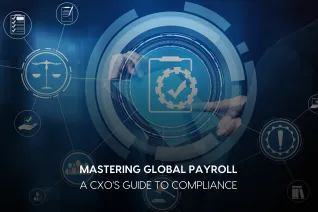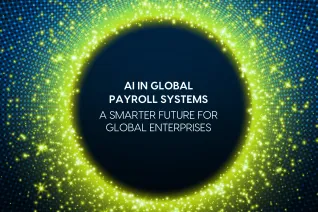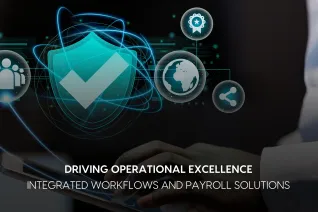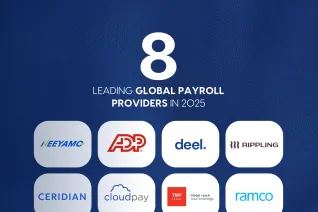A Guide to Endure the Global Pandemic : With Rangarajan Seshadri

It is almost half a year since the deadly pandemic turned the global economy on its head. Several global enterprises have been tested for their business resilience and are beginning to scout for opportunities amid uncertainties. The COVID-19 outbreak is a significant moment for employees as well as executive leadership teams. We virtually connected with Rangarajan Seshadri, CEO at Neeyamo to understand how organizations around the world are coping up with the pandemic and how leadership teams need to strategically handle this crisis in the long run.
1. How are organizations responding to the pandemic-ridden scenario today?
The spread of COVID-19 has so far been unprecedented and the impact this global pandemic has created is unparalleled. This impact, however, will change from one industry to another; it depends on the maturity of the organizations. But fortunately, several companies have been able to respond to the stimulus with robust business continuity plans. The two factors that would contribute to the biggest difference is the agility of the business and resilience in leadership
There is no doubt that this black swan event and the country-wide lockdowns were both unpredictable and unavoidable. With the right tools and a deploy-ready BCP in place, Neeyamo was prepared for such uncertainties. We were able to make the shift from office to remote in 24-hoursand making this move with our 2,000+ global employees was no mere feat. Technology is the clear driver, as always as it has played a major role in managing and engaging our global employee bases. Our defense-in-depth BCP ensured little to no-impact on service continuity to our customers. We have been able to deliver uninterrupted services to all our customers’ employees with the highest accuracy.
Enterprises have begun understanding the sheer importance of digital transformation across their products and operations. The need was always there. But the pandemic has been an inflection point. Business resilience and the will to proactively explore newer opportunities amidst uncertainties are key.
Those operating with inherited legacy technologies and processes will find themselves being left behind in the race to achieving business success in these testing times. Leadership teams would have to strongly focus on devising key strategies that mitigate risks and treat this crisis as a chance to reinvent and realign org-wide goals.
2. How should companies sharpen their contingency operational plans to go a long way?
The resilience of critical system operations is paramount to your company’s successful survival amid uncertainties. Companies should take this pandemic as the turning point and identify all possible ways to establish and maintain operational certainty.
Neeyamo is focused on building a business continuity plan that would establish a ‘rapid response room’ where key stakeholders can connect (virtually) to discuss issues faced, derive rapid solutions to the issues from both the short-term and long-term-standpoint, and help our workforce adopt the solutions. Design-thinking is at the heart of our operational strategies where we constantly identify, align, and implement processes to strengthen our ability to ensure continual service delivery.
3. Pandemics are a rarity that we often cannot anticipate. In that case, how do you think companies should manage recruitment and talent? Has talent management taken a hit?
While there is no single answer to these questions, organizations should understand the current landscape and build strategies regarding managing talent and recruitment. A handful of companies are saying that they would hire as usual and a majority has been in a dilemma as to how recruitment would happen in the coming days, or months to be precise. Several organizations are deferring the joining dates of new recruits or are found shifting to contractual staffing while a handful is even revoking offers.
At Neeyamo, our core focus is on people. We are part of a business that not just supports people; whatever we do holds ‘people’ as the centerpiece strategy. Remote working is steadily becoming a new normal and tech-savvy personnel with the experience of running operations using virtual platforms is a definite bonus to any team or organization. We are prioritizing hiring on the basis of necessity, location, and work arrangements.
Despite the pressing need to cut costs, companies should consider laying off as the last resort when it comes to talent management. At Neeyamo, our response to COVID-19’s impact on business has not been to lay-off our employees, but to focus on reskilling and upskilling our employees by identifying newer avenues to deploy them. Ensuring employee welfare, especially during this period, is extremely important. It is absolutely important to ensure employees have money in their pockets to take care of their daily needs. At a time when we are seeing several companies laying off their employees and reducing monthly income, we have decided to put our employees first and ensure that fair increments are provided for all deserving employees, based on our annual performance evaluation process.
At Neeyamo, we believe we are accountable to our stakeholders and our biggest stakeholders are our customers and employees. There are about 2,000+ employee families that depend on us, and we take our responsibilities very strongly. The work culture at Neeyamo values learning to the highest extent and the organization firmly believes in creating a learning culture that provides adequate opportunities for employees to learn and equip themselves for change.
4. What do you think are the spillover effects of this global pandemic and the impending economic recession?
The economic situation remains fluid. There is a shift towards a recession mindset. When the pandemic will end and when the global economy will recover is hard to predict. Global unemployment and employee turnover are rising. The consequences of the pandemic and the recession have been bad, but it is the choice of the company to hit the brake or drift the curve. There are new opportunities for companies as well. There would be an increase in the need for remote recruitment and virtual onboarding. Ultimately, hiring from anywhere becomes possible.
Companies should plan their business with utmost caution. The budget 2020 might need a complete revamp as budgets and cash flows were created based on a set of assumptions in a ‘most likely’ scenario. Leadership teams would be focusing on building two alternate business plans – Plan A based on what you expect to happen, and Plan B based on the worst-case that can happen. Circumstances are changing rapidly, and adaptability is what will determine the winners of the battle.
5. Given the situation now, what do you anticipate will change for the good? How do you envision the coming years to be?
The longevity of the outbreak and the severity of its impact on businesses worldwide will prompt considerable evolution with long-term changes. Questions like ‘will people still reconsider traveling for meetings and events despite receiving all-safe sign’ or ‘will companies choose to allow a considerable size of its employees to continue working from home’ will be answered as more and more companies become accustomed to this new normalcy. The truth is that right now none of us can comment on what the future holds for us. It is high time that we become wisely proactive, make the right decisions at the right time, and ask the long-term questions that would aid us in finding newer opportunities.
This volatility and uncertainty will force companies to learn new ways to survive and thrive. What is important is to not forget the hard-learned lessons as situations improve sooner or later.
To learn more on how organizations should work towards managing their workforce amid this global pandemic, feel free to get in touch with us. We will be glad to assist you.
Latest Resources
Stay informed with latest updates
If you're curious and have a thirst for knowledge pertaining to the HR, payroll, and EOR universe, don't miss out on subscribing to our resources.















